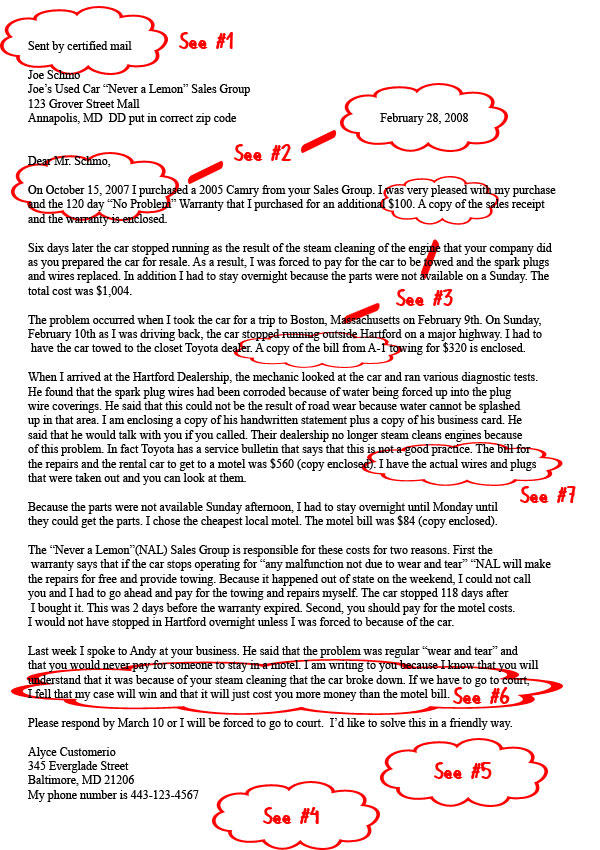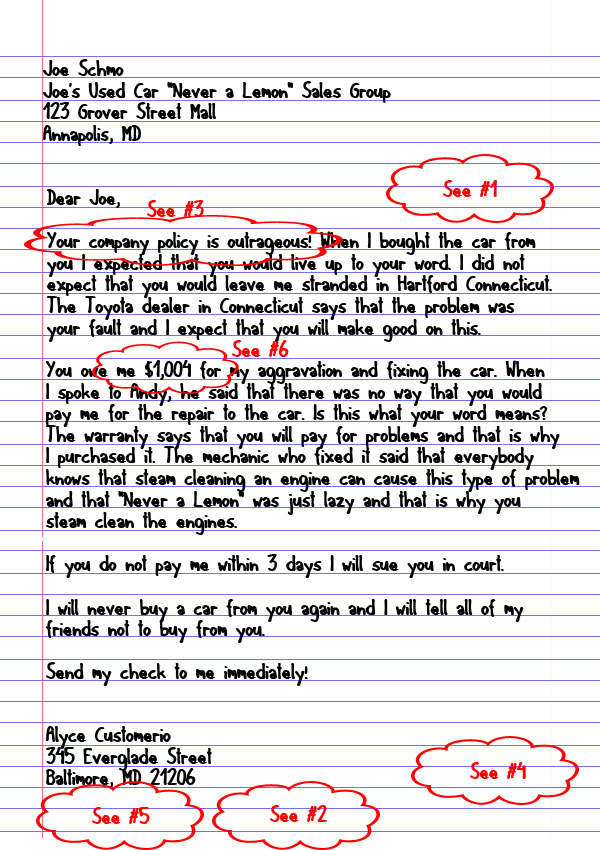Topics on this page
General Tips
The word “demand” is misleading. “Demand” makes it sound as if the best strategy is to be aggressive in your approach to the person or business with whom you have a dispute.
- Try to resolve your dispute with the other side before going to court.
- Approach the dispute calmly. No matter how angry or hurt you are, yelling or saying rude things will not help to resolve the dispute.
- Talk to your friends or family about your feelings.
Logically work through the following steps to see if you can resolve the problem without going to court.
- Figure out how you have been harmed and what is reasonable to fix it.
- Plan a few key points to discuss with the other side.
- Summarize the agreement between you (e.g., I brought silk jacket to you to have the buttons replaced. You told me that it would be “as good as new” in 1 week.).
- Summarize the exact harm to you. (e.g., When I came back to get it, I was told that it had already been picked up. But I did not pick it up, and now I do not have my good jacket which cost $189.)
- Describe how you believe it can be fixed. Be specific and reasonable. (e.g., Since you lost my jacket, I am asking you to give me the $200 to replace it. I think that this is fair even though the jacket was six months old because I had not worn it much, and I still have to go to the mall to buy another.)
- Show how you calculated the money demand. (e.g., I looked up the same jacket in the store’s website. Here is a printout showing the $189 price tag plus 6% tax.)
- Talk with the other side.
- If it is a business, talk to the person with the highest authority you can. You need to discuss it with someone who has the power to help resolve it. Ask for an owner or supervisor.
- Remember why you are there. You are trying to persuade them to give you what you want.
- Be nice -- you are not there to complain! You are there to try to get what you feel you deserve.
- If you are not able to reach a resolution or to talk to a supervisor, write a letter with the same information and approach. You will also want to say – in a business-like way – that you plan to go to court, if needed.
- Use a computer (or a typewriter). It will give the letter a business-like appearance.
- Research the correct address for daytime delivery. Send it to multiple addresses, if needed.
- Include how they can contact you during the day and at night.
- Ask for a response by a specific date. Again be reasonable.
- Send the letter by certified mail, return receipt requested. Also send it by regular mail.
Tips:
- If the other side refuses to accept the certified letter, you can still tell the judge that the regular mail was not returned so the other side probably got the letter. Make sure you have your address as the return address.
- Keep a copy of the letter you send. Keep the mailing receipt. This is part of your evidence if you go to court.
- Wait until your deadline for a response has been reached.
- If they make an offer that differs from your request, keep in mind that there will be court costs and time off from work to pursue the case in court. Maybe you can compromise.
- If you are not successful in resolving the dispute, consider filing a claim in District Court.
Good Demand Letter
- Sent by certified mail so you can prove it was received.
- The letter is dated plus the story includes all of the important dates to show that the warranty is still in force.
- Copies (not the originals) of the documents that support your story are enclosed.
- You are polite.
- You show how the amount that you want was calculated.
- You point out why it makes sense to settle.
- You collected the physical and written evidence to prove your claim.

Bad Demand Letter
- Dates are important. Date the letter. Include the dates of the incident and the complaint.
- It is useful to type the letter. Public libraries have computers you can use.
- Be polite. You are trying to persuade the other side. It costs time and money to go to court.
- Make sure that your letter gets to the other side. Spend the money for “certified mail, return receipt requested”
- Include copies of relevant evidence.
- Be specific. Even though the other side knows about much of the story, remember that you are building your case. Repeat the information anyway. You may need to show the letter in court. Plus it helps the other side to make their decision by seeing how good your claim is.






